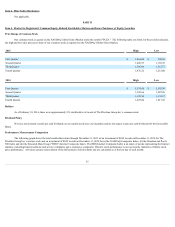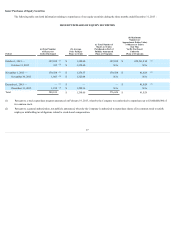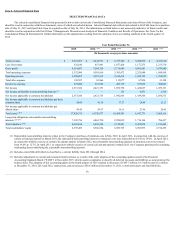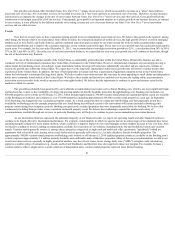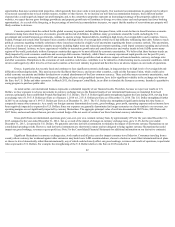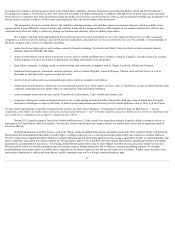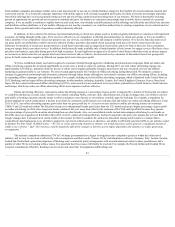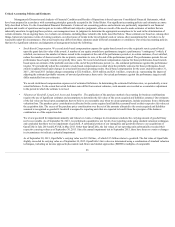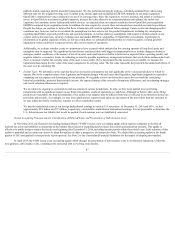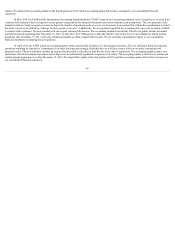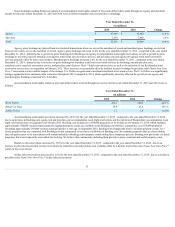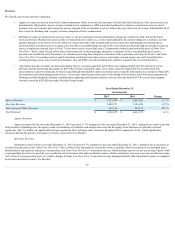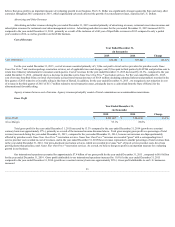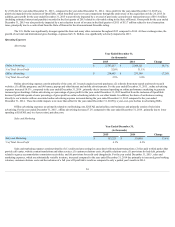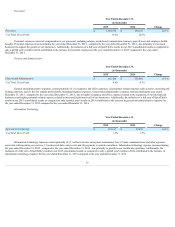Priceline 2015 Annual Report Download - page 48
Download and view the complete annual report
Please find page 48 of the 2015 Priceline annual report below. You can navigate through the pages in the report by either clicking on the pages listed below, or by using the keyword search tool below to find specific information within the annual report.
voluntarily implemented these commitments throughout the European Economic Area and Switzerland on July 1, 2015, which resolved the concerns of various
other countries. However, in August 2015 France adopted legislation known as the "Macron Law" making price parity agreements illegal, including those that had
been approved by the French NCA. For more information on these investigations and their potential effects on our business, see Note 15 to our Consolidated
Financial Statements and Part I Item 1A Risk Factors - " As the size of our business grows, we may become increasingly subject to the scrutiny of anti-trust and
competition regulators. " To the extent that regulatory authorities impose fines or require changes to our business practices or to those currently common to the
industry or legislation is enacted with a similar effect, our business, competitive position and results of operations could be materially and adversely affected.
Negative publicity regarding any such investigations could adversely affect our brand and therefore our market share and results of operations.
Seasonality
A meaningful amount of our gross bookings are generated early in the year, as customers plan and reserve their spring and summer vacations in Europe
and North America. From a cost perspective, we expense the substantial majority of our advertising activities as the expense is incurred, which is typically in the
quarter in which reservations are booked. However, we generally do not recognize associated revenue until future quarters when the travel occurs. As a result, we
have historically experienced our highest levels of profitability in the second and third quarters of the year, which is when we experience the highest levels of
accommodation checkouts for the year for our European and North American businesses. We experience the highest levels of booking and travel consumption for
our Asia-Pacific and South American businesses in the first and fourth quarters. As these businesses have generally been growing faster than our European and
North American businesses, our operating results for the fourth quarter of the year have become more significant over time as a percentage of full year operating
results.
In addition, the date on which certain holidays fall can have an impact on our quarterly results. For example, in 2013 our second quarter year-over-year
growth rates in revenue, gross profit, operating income and operating margins were adversely affected by Easter falling in the first quarter instead of the second
quarter, as it did in 2012. Conversely, our second quarter 2014 year-over-year growth rates in revenue, gross profit, operating income and operating margins were
favorably impacted by Easter falling in the second quarter instead of the first quarter, as it did in 2013. Similarly to 2013, in 2016 Easter will fall in the first quarter
instead of the second quarter, and will therefore likely have a positive effect on our first quarter 2016 year-over-year growth rates and a negative effect on our
second quarter 2016 year-over-year growth rates as compared to the same periods in 2015 when Easter fell in the second quarter.
The impact of seasonality can be exaggerated in the short term by the gross bookings growth rate of the business. For example, in periods where our
growth rate substantially decelerates, our operating margins typically benefit from relatively less variable advertising expense. In addition, gross profit growth is
typically less impacted in the near term due to the benefit of revenue related to reservations booked in previous quarters.
Other Factors
We believe that our future success depends in large part on our ability to continue to profitably grow our brands worldwide, and, over time, to offer other
travel and travel-related services and further expand into other international markets. Factors beyond our control, such as worldwide recession, oil prices, terrorist
attacks, unusual weather patterns, natural disasters such as earthquakes, hurricanes, tsunamis, floods and volcanic eruptions, travel-related health concerns
including pandemics and epidemics such as Ebola, Zika, Influenza H1N1, avian bird flu, SARS and MERS, political instability, regional hostilities, imposition of
taxes or surcharges by regulatory authorities or travel-related accidents, could adversely affect our business and results of operations. For example, our business
and operations were negatively impacted by the terror attacks in Paris in November 2015; Hurricane Sandy, which disrupted travel in the northeastern United
States in late 2012; a major earthquake, tsunami and nuclear emergency in Japan in 2011; severe flooding in Thailand in October 2011; and disruptive civil unrest
in Thailand in 2010 and 2014. In addition, MERS had an adverse impact on our business in northeast Asia in 2015. Future terrorist attacks, natural disasters, health
concerns or civil or political unrest could further disrupt our business and operations.
We intend to continue to invest in marketing and promotion, technology and personnel within parameters consistent with attempts to improve long-term
operating results, even if those expenditures create pressure on operating margins. We have experienced pressure on operating margins as we prioritize initiatives
that drive growth. For example, we are investing in growth initiatives at OpenTable, including international expansion, and in building our BookingSuite partner-
facing software services platform. We also intend to broaden the scope of our business, and to that end, we explore strategic alternatives from time to time in the
form of, among other things, mergers and acquisitions. Our goal is to grow gross profit and achieve healthy operating margins in an effort to maintain profitability.
The uncertain environment described above makes the prediction of future results of operations difficult, and accordingly, we may not be able to sustain gross
profit growth and profitability.
45


